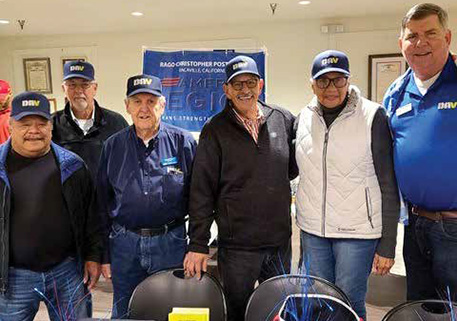 Only a few of the important legislative measures introduced at the beginning of the 115th Congress to improve services for women veterans have been enacted. One of the most comprehensive bills—the Deborah Sampson Act—has stalled on Capitol Hill. In March 2017, Senate Veterans’ Affairs Committee ranking member Jon Tester introduced this important measure (S. 681), which encompasses a number of key recommendations made in DAV’s 2014 landmark report Women Veterans: The Long Journey Home to improve and expand Department of Veterans Affairs programs and services for women veterans. In May 2017, House Veterans’ Affairs Committee member Elizabeth Esty introduced a companion bill, H.R. 2452. But while the Deborah Sampson Act has received strong bipartisan support in Congress and the veterans community, the legislation has not progressed beyond a Senate hearing held in May 2017.
Only a few of the important legislative measures introduced at the beginning of the 115th Congress to improve services for women veterans have been enacted. One of the most comprehensive bills—the Deborah Sampson Act—has stalled on Capitol Hill. In March 2017, Senate Veterans’ Affairs Committee ranking member Jon Tester introduced this important measure (S. 681), which encompasses a number of key recommendations made in DAV’s 2014 landmark report Women Veterans: The Long Journey Home to improve and expand Department of Veterans Affairs programs and services for women veterans. In May 2017, House Veterans’ Affairs Committee member Elizabeth Esty introduced a companion bill, H.R. 2452. But while the Deborah Sampson Act has received strong bipartisan support in Congress and the veterans community, the legislation has not progressed beyond a Senate hearing held in May 2017.
“Our report identified gaps in VA programs for women, and we have long advocated for a more comprehensive provision of VA women’s health services that appropriately recognizes and honors their service and sacrifice,” said National Legislative Director Joy Ilem, adding that women still lack consistent access to a full range of gender-specific benefits and services at all VA facilities, and further evaluation and implementation of programs that meet the unique needs of women veterans are needed. “We are pleased to have legislation on the table that addresses a number of key recommendations from our report, but it’s time to take further action and make these proposals a reality.”
If enacted, this legislation would require the VA to establish a peer-to-peer assistance program for women veterans; create a centralized location for information on women veterans benefits and services; provide legal services to homeless women veterans; address specific VA infrastructure needs to support the care of women veterans; expand post-delivery care services for women veterans receiving maternity care; collect data on VA programs and services by gender and minority status; and ensure specific staffing levels and training for women’s health providers and the VA’s women veteran program managers.
It’s time to move women veterans legislation—such as the Deborah Sampson Act—out of consideration and into law.
Learn More
Find out more about the Deborah Sampson Act—and other women veterans legislation supported by DAV—at dav.org/women-veterans. Stay updated on important veterans legislation by visiting dav.org/CAN.






